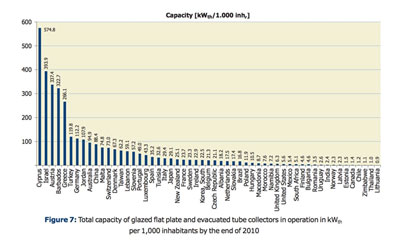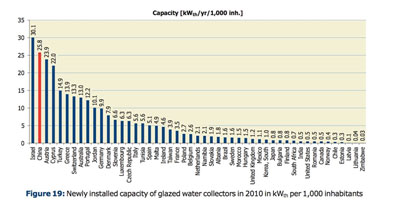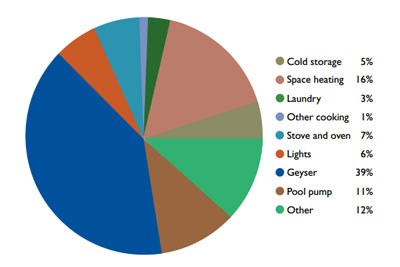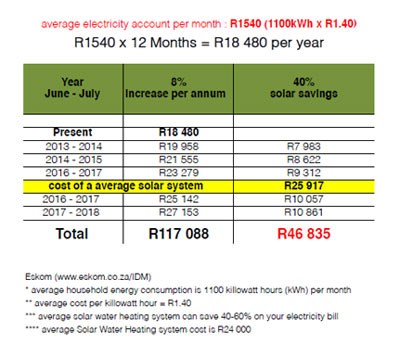The South African economy is very sensitive towards the topic of energy, mostly owing to the price of electricity, its scarcity, climate change and a focus on sustainable living.
In a bid not only to combat the electricity shortage issue, but to force a movement towards an increase in sustainable living, late last year new legislation was passed whereby at least half of all hot water supply in all new buildings, residential or commercial, is to be produced by means other than electrical resistance heating (i.e. Eskom). According to the new legislation ('SANS10400XA'): "A minimum of 50% by volume of the annual average hot water heating requirement shall be provided by means other than electrical resistance heating including, but not limited to solar heating, heat pump, heat recovery from other systems or processes."
The result is that builders, contractors, and even architects, must change the way in which they plan and construct all new buildings to ensure that the new laws are met. Statistics identify the support of the new legislation, showing that the use of solar power in both residential and commercial buildings is now climbing swiftly, and has been doing so since the new legislation was passed.
Remoulded the way in which properties are built
As a result of the new building regulations, homeowners and companies are becoming more aware of the need to invest in solar energy and more predominantly solar water heating (SWH). The bottom line is that this new legislation has now remoulded the way in which properties are built, as architects/designers now need to implement the new standards and requirements to ensure they meet the new legislation. The building industry has become even stricter and if the regulations are not adhered to, it will result in plans not being passed.
Due to South Africa's historic electricity supply issues, resulting in unannounced load shedding, the market has been forced to become more educated and reliant on solar power and its benefits.
In 2008, the South African government introduced the solar water heating programme to the market to facilitate the transfer to solar water heating. Nersa provided Eskom with R1.068 billion to fund the rebate programme and in 2008 less than 200 solar water heating systems were installed per month. This figure has recently increased to an average of over 6000 per month, showing a huge increase in demand. SA had a drop in sales over the last year, primarily as a result of the inferior quality of products being imported and introduced into the market.
Consumer confidence
The inferior products, as well as uneducated and ill-experienced companies installing the incorrect or poor quality systems for specific homes or environments, has attributed to a large decline in consumers and trade installing solar water heating units. This affects the entire industry and consumers became less confident in solar power. These poor quality products are being filtered out, but again it is important that consumers do their research when making solar power decisions. Poor management of the rebate programme in the past was a factor that also attributed to its uncertainty, which is why we take over and manage this procedure on behalf of our customers.
AGS uses a product called Chromagen, the current market leader in Israel with over 50 years of experience in specialised designs to ensure top-of-the-line manufacturing and long-life warranties (Israel is currently the global leader in terms of solar heating installations per capita). Israel has had a SWH building regulation in place since 1980 and 95% of households in Israel now use SWHs.

Source: Solar Heat Worldwide, Markets and Contribution to the energy supply 2010, Edition 2012 – Werner Weiss and Franz Mauthner
click to enlarge
Source: Solar Heat Worldwide, Markets and Contribution to the energy supply 2010, Edition 2012 – Werner Weiss and Franz Mauthner
click to enlargeEducating consumers is the key to ensuring that the new legislation is adhered to and the numerous benefits of solar heating are realised. Due to our geographic location, we have an abundance of sunshine with some provinces receiving over 300 days of sunshine per annum. This high level of solar radiation allows solar water heating to be the most beneficial and cost-efficient form of energy, and ensures that even during winter there is ample supply of electricity for heating a household geyser. By South Africa having amongst the highest winter solar radiation, the solar geyser will still operate even if there are fewer sunlight hours. Even without sunshine, a solar geyser is more efficient in terms of electricity usage than a regular geyser. This is due to its insulation qualities as it retains heat more effectively.
At the end of the day, such units reduce electricity costs drastically via the lower power usage and rebate programme, and, at the same time, lower the environmental impact of a building or home. By installing a SWH you can save up to 40 to 60% on electricity from day one.
The new legislation is in fact doing homeowners a big favour. We continue to receive an increasing amount of queries from homeowners and those in the trade alike as they realise the new laws which need be adhered to, not to mention the financial benefits of moving to solar.












































